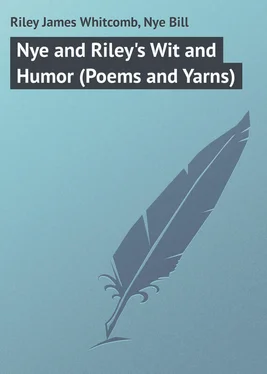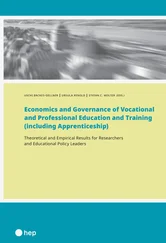James Riley - Nye and Riley's Wit and Humor (Poems and Yarns)
Здесь есть возможность читать онлайн «James Riley - Nye and Riley's Wit and Humor (Poems and Yarns)» — ознакомительный отрывок электронной книги совершенно бесплатно, а после прочтения отрывка купить полную версию. В некоторых случаях можно слушать аудио, скачать через торрент в формате fb2 и присутствует краткое содержание. Издательство: Иностранный паблик, Жанр: foreign_prose, foreign_humor, на английском языке. Описание произведения, (предисловие) а так же отзывы посетителей доступны на портале библиотеки ЛибКат.
- Название:Nye and Riley's Wit and Humor (Poems and Yarns)
- Автор:
- Издательство:Иностранный паблик
- Жанр:
- Год:неизвестен
- ISBN:нет данных
- Рейтинг книги:3 / 5. Голосов: 1
-
Избранное:Добавить в избранное
- Отзывы:
-
Ваша оценка:
- 60
- 1
- 2
- 3
- 4
- 5
Nye and Riley's Wit and Humor (Poems and Yarns): краткое содержание, описание и аннотация
Предлагаем к чтению аннотацию, описание, краткое содержание или предисловие (зависит от того, что написал сам автор книги «Nye and Riley's Wit and Humor (Poems and Yarns)»). Если вы не нашли необходимую информацию о книге — напишите в комментариях, мы постараемся отыскать её.
Nye and Riley's Wit and Humor (Poems and Yarns) — читать онлайн ознакомительный отрывок
Ниже представлен текст книги, разбитый по страницам. Система сохранения места последней прочитанной страницы, позволяет с удобством читать онлайн бесплатно книгу «Nye and Riley's Wit and Humor (Poems and Yarns)», без необходимости каждый раз заново искать на чём Вы остановились. Поставьте закладку, и сможете в любой момент перейти на страницу, на которой закончили чтение.
Интервал:
Закладка:
The play is thoroughly enjoyable all the way through, especially Cæsar's funeral. The idea of introducing a funeral and engaging Mark Antony to deliver the eulogy, with the understanding that he was to have his traveling expenses paid and the privilege of selling the sermon to a syndicate, shows genius on the part of the joint authors. All the way through the play is good, but sad. There is no divertisement or tank in it, but the funeral more than makes up for all that.
Where Portia begs Brutus, before the assassination, to tell her all and let her in on the ground floor, and asks what the matter is, and he claims that it is malaria, and she still insists and asks, "Dwell I but in the suburbs of your good pleasure?" and he states, "You are my true and honorable wife, as dear to me as are the ruddy drops that visit my sad heart," I forgot myself and wept my new plug hat two-thirds full. It is as good as anything there is in Josh Whitcomb's play.
Booth and Barrett have the making of good actors in them. I met both of these gentlemen in Wyoming some years ago. We met by accident. They were going to California and I was coming back. By some oversight we had both selected the same track, and we were thrown together. I do not know whether they will recall my face or not. I was riding on the sleeper truck at the time of the accident. I always take a sleeper and always did. I rode on the truck because I didn't want to ride inside the car and have to associate with a wealthy porter who looked down upon me. I am the man who was found down the creek the next day gathering wild ferns and murmuring, "Where am I?"
The play of "Julius Cæsar" is one which brings out the meanness and magnetism of Cassius, and emphasizes the mistaken patriotism of Brutus. It is full of pathos, duplicity, assassination, treachery, erroneous loyalty, suicide, hypocrisy, and all the intrigue, jealousy, cowardice and deviltry which characterized the politics of fifty years B. C., but which now, thanks to the enlightenment and refinement which twenty centuries have brought, are known no more forever. Let us not forget, as we enter upon the year 1888, that it is a Presidential year, and that all acrimony will be buried under the dew and the daisies, and that no matter how high party spirit may run, there will be no personal enmity.
His First Womern
I buried my first womern
In the spring; and in the fall
I was married to my second,
And haint settled yit at all? —
Fer I'm allus thinkin' – thinkin'
Of the first one's peaceful ways,
A-bilin' soap and singin'
Of the Lord's amazin' grace.
And I'm thinkin' of her, constant,
Dyin' carpet-chain and stuff,
And a-makin' up rag-carpets,
When the floor was good enough!
And I mind her he'p a-feedin'
And I recollect her now
A-drappin' corn, and keepin'
Clos't behind me and the plow!
And I'm allus thinkin' of her
Reddin' up around the house;
Er cookin' fer the farm-hands;
Er a-drivin' up the cows. —
And there she lays out yender
By the lower medder-fence,
Where the cows was barely grazin',
And they're usin' ever sence.
And when I look acrost there —
Say its when the clover's ripe,
And I'm settin', in the evenin',
On the porch here, with my pipe,
And the other'n hollers "Henry!" —
W'y, they ain't no sadder thing
Than to think of my first womern
And her funeral last spring
Was a year ago.
This Man Jones
This man Jones was what you'd call
A feller 'at had no sand at all:
Kindo consumpted, and undersize,
And saller-complected, with big sad eyes,
And a kind-of-a-sort-of-a-hang-dog style,
And a sneakin' kind-of-a-half-way smile
That kindo give him away to us
As a preacher, maybe, or sumpin' wuss.
Didn't take with the gang – well, no —
But still we managed to use him, though, —
Coddin' the gilley along the rout'
And drivin' the stakes that he pulled out; —
For I was one of the bosses then
And of course stood in with the canvas-men —
And the way we put up jobs, you know,
On this man Jones jes' beat the show!
Used to rattle him scandalous,
And keep the feller a-dodgin' us,
And a-shyin' round jes' skeered to death,
And a-feered to whimper above his breath;
Give him a cussin', and then a kick,
And then a kind-of-a back-hand lick —
Jes' for the fun of seein' him climb
Around with a head on half the time.
But what was the curioust thing to me,
Was along o' the party – let me see, —
Who was our "Lion Queen" last year? —
Mamzelle Zanty, er De La Pierre? —
Well, no matter! – a stunnin' in mash,
With a red-ripe lip, and a long eye-lash,
And a figger sich as the angels owns —
And one too many for this man Jones:
He'd always wake in the afternoon
As the band waltzed in on "the lion tune,"
And there, from the time that she'd go in,
Till she'd back out of the cage agin,
He'd stand, shaky and limber-kneed —
'Specially when she come to "feed
The beast raw meat with her naked hand" —
And all that business, you understand.
And it was resky in that den —
For I think she juggled three cubs then,
And a big "green" lion 'at used to smash
Collar-bones for old Frank Nash;
And I reckon now she haint forgot
The afternoon old "Nero" sot
His paws on her: – but as for me,
It's a sort-of-a-mixed-up mystery.
Kindo' remember an awful roar,
And see her back for the bolted door —
See the cage rock – heerd her call
"God have mercy!" and that was all —
For ther haint no livin' man can tell
What it's like when a thousand yell
In female tones, and a thousand more
Howl in bass till their throats is sore!
But the keeper said as they dragged her out,
They heerd some feller laugh and shout:
"Save her! Quick! I've got the cuss!"
… And yit she waked and smiled on us!
And we daren't flinch – for the doctor said,
Seein' as this man Jones was dead,
Better to jes' not let her know
Nothin' o' that for a week or so.
How to Hunt the Fox
The joyous season for hunting is again upon us, and with the gentle fall of the autumn leaf and the sough of the scented breezes about the gnarled and naked limbs of the wailing trees – the huntsman comes with his hark and his halloo and hurrah, boys, the swift rush of the chase, the thrilling scamper 'cross country, the mad dash through the Long Islander's pumpkin patch – also the mad dash, dash, dash of the farmer, the low moan of the disabled and frozen-toed hen as the whooping horsemen run her down; the wild shriek of the children, the low melancholy wail of the frightened shoat as he flees away to the straw pile, the quick yet muffled plunk of the frozen tomato and the dull scrunch of the seed cucumber.
The huntsman now takes the flannels off his fox, rubs his stiffened limbs with gargling oil, ties a bunch of firecrackers to his tail and runs him around the barn a few times to see if he is in good order.
The foxhound is a cross of the bloodhound, the grayhound, the bulldog and the chump. When you step on his tail he is said to be in full cry. The foxhound obtains from his ancestors on the bloodhound side of the house his keen scent, which enables him while in full cry 'cross country to pause and hunt for chipmunks. He also obtains from the bloodhound branch of his family a wild yearning to star in an "Uncle Tom" company, and watch little Eva meander up the flume at two dollars per week. From the grayhound he gets his most miraculous speed, which enables him to attain a rate of velocity so great that he is unable to halt during the excitement of the chase, frequently running so far during the day that it takes him a week to get back, when, of course, all interest has died out. From the bulldog the foxhound obtains his great tenacity of purpose, his deep-seated convictions, his quick perceptions, his love of home and his clinging nature. From the chump the foxhound gets his high intellectuality and that mental power which enables him to distinguish almost at a glance the salient points of difference between a two-year-old steer and a two-dollar bill.
Читать дальшеИнтервал:
Закладка:
Похожие книги на «Nye and Riley's Wit and Humor (Poems and Yarns)»
Представляем Вашему вниманию похожие книги на «Nye and Riley's Wit and Humor (Poems and Yarns)» списком для выбора. Мы отобрали схожую по названию и смыслу литературу в надежде предоставить читателям больше вариантов отыскать новые, интересные, ещё непрочитанные произведения.
Обсуждение, отзывы о книге «Nye and Riley's Wit and Humor (Poems and Yarns)» и просто собственные мнения читателей. Оставьте ваши комментарии, напишите, что Вы думаете о произведении, его смысле или главных героях. Укажите что конкретно понравилось, а что нет, и почему Вы так считаете.












